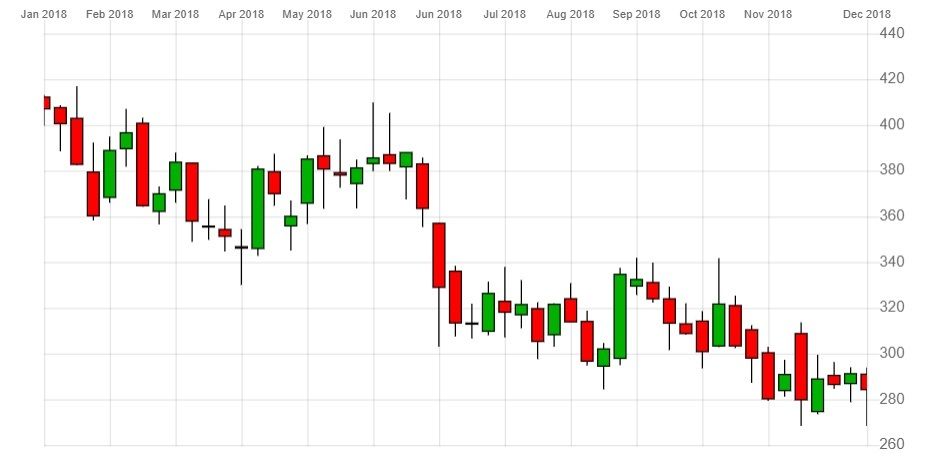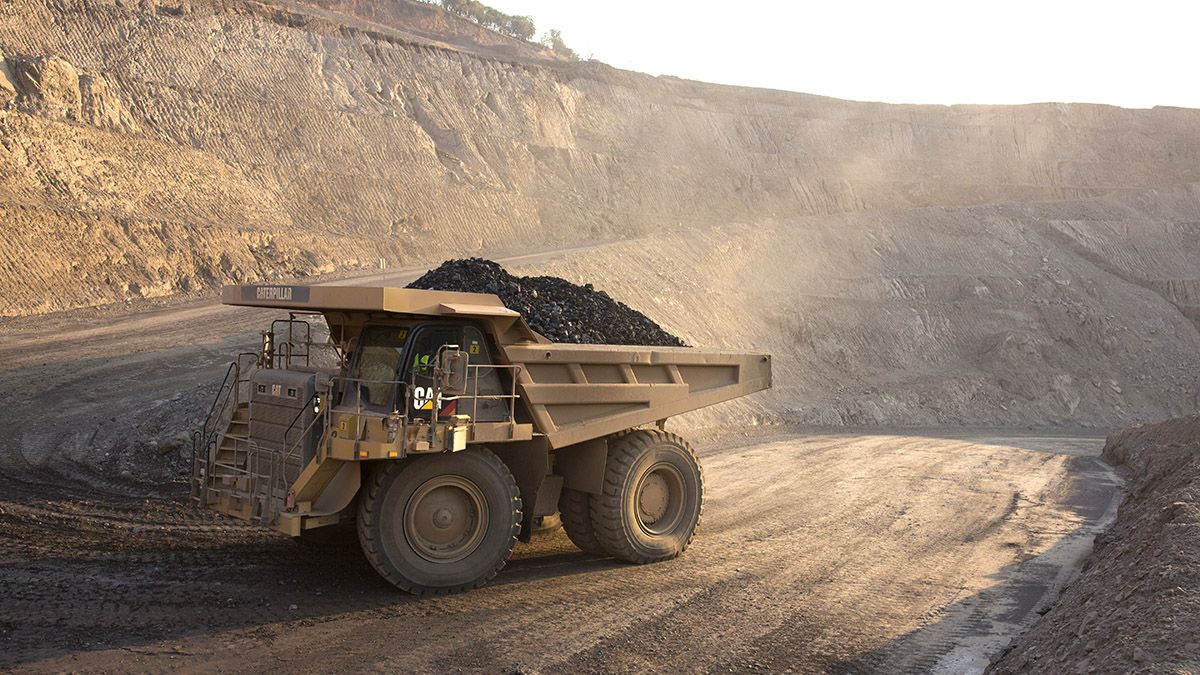Scandal is nothing new for Glencore [GLEN], one of the world’s most powerful commodity traders and miners, but a string of alleged corruption in 2018 combined with market uncertainty has meant its share price has taken a massive hit.
Although the company had slowly rebuilt its market value from a massive sell-off in 2015, when its shares fell by more than 87% after copper and coal sank to six-year lows, Glencore’s share price is again deteriorating.
Ongoing investigations have weighed on the stock, which was down over 28% during the course of 2018.
Powered by CMC Markets, as at 11 January 2019
However, 2019 could spell a different story for the company as the mining industry has had a boost ahead of the prospective trade talks between the US and China in Beijing. Glencore led the sector higher with gains of 3.5% on 4 January 2019, after falling in the first three days of the year.
Whether Glencore can maintain this upward trajectory in the near term is however uncertain, especially as the ambiguity surrounding the resources sector remains high, with fears about the global economy continuing to plague these stocks.
Swept up in scandals
The Swiss-based group is also facing a string of legal challenges, including the US Department of Justice’s and the Ontario Securities Commission’s investigations into possible corruption and bribery in relation to the Brazilian Car Wash scandal.
As part of the corruption probe, Glencore submitted documents that subsequently led to the head of its copper business, Aristotelis Mistakidis, being fined and banned from being a director in Canada after it was found that he had misreported the amount of metal it had mined.
“If anything, the turbulence of the last year has forced investors to ask more questions about the company, about management procedures; whereas before people were focused on the dollars and cents and tonnes out of the ground. Now there’s an increased awareness that these kinds of things have become just as important,” Paul Gait, analyst at Bernstein Research, said.
There’s also an ongoing Australian Taxation Office investigation, the result of a tip off within the leaked Paradise Papers in 2017, that joins the massing dark clouds over Glencore’s head.
“If anything, the turbulence of the last year has forced investors to ask more questions about the company, about management procedures... Now there’s an increased awareness that these kinds of things have become just as important” - Paul Gait, analyst at Bernstein Research
In response to Glencore’s business model coming under the microscope and shareholders suing the company over alleged misleading statements, its share price has plummeted to former lows. It currently trades at around 277p, which is down 48% since the company floated on the London Stock Exchange in 2011 at 530p.
Unfaltering balance sheet
Despite its legal troubles and the wider market’s volatility, Glencore has continued to improve its financial earnings in recent years, raising its net income by 13% to $2.7bn, according to its 2018 half-year report.
It is because of Glencore’s healthy balance sheet that it has been able to distribute $2.85bn to its shareholders, fund a $1bn buyback programme and raise its earnings per share by 12% to $0.19.
| Adjusted EBITDA HY 2018, % change YoY | +23% |
| Market cap | £40.51bn |
| PE Ratio (TTM) | 6.98 |
| EPS (TTM) | 42.00 |
Glencore stock vitals, Yahoo finance, as at 11 January 2019
In addition, as the demand for alternative energy increases, Glencore’s exposure to raw materials such as cobalt, that is used in the manufacturing of electric vehicles, could be a massive growth area for the business, especially given it is the largest producer of this key battery ingredient.
The company has also began to make new appointments, including Peter Freyberg as head of the company’s industrial mining assets, a new position with responsibility for and oversight over all of the company’s industrial mining assets.
“There comes a time where the younger generation needs to take over,” Glencore chief executive officer Ivan Glasenberg recently commented.
These measures, alongside the strength of its diversified business model and commodity mix, could lead to improving financial prospects in an era where tighter US monetary policy could target the wider resources industry.
Rising US interest rates
Like most companies with businesses in the US, Glencore’s share price performance could be negatively impacted by another interest rate rise.
If the Federal Reserve decides to go ahead with another three rate hikes in 2019 the strengthening dollar could become increasingly stronger, which would reduce demand for commodities.
However, these macro headwinds have left the stock with a low P/E ratio of 6.98, and now that the company has begun to improve its business strategy by cutting costs and reducing debt, both factors could indicate strong growth potential in the long-term.
6.98
Glencore stock P/E ratio (TTM)
Indeed, Glencore has been known to turn things around. Back in 2015 when its share price reached record lows because of its mounting debt, the company managed to strengthen its balance sheet, shelve its dividend, deleverage and raise money from shareholders.
However, whether Glencore can swiftly shake-off its scandal-ridden reputation to call on a share price rally looks to be out of its hands.
Disclaimer Past performance is not a reliable indicator of future results.
CMC Markets is an execution-only service provider. The material (whether or not it states any opinions) is for general information purposes only, and does not take into account your personal circumstances or objectives. Nothing in this material is (or should be considered to be) financial, investment or other advice on which reliance should be placed. No opinion given in the material constitutes a recommendation by CMC Markets or the author that any particular investment, security, transaction or investment strategy is suitable for any specific person.
The material has not been prepared in accordance with legal requirements designed to promote the independence of investment research. Although we are not specifically prevented from dealing before providing this material, we do not seek to take advantage of the material prior to its dissemination.
CMC Markets does not endorse or offer opinion on the trading strategies used by the author. Their trading strategies do not guarantee any return and CMC Markets shall not be held responsible for any loss that you may incur, either directly or indirectly, arising from any investment based on any information contained herein.
*Tax treatment depends on individual circumstances and can change or may differ in a jurisdiction other than the UK.
Continue reading for FREE
- Includes free newsletter updates, unsubscribe anytime. Privacy policy





